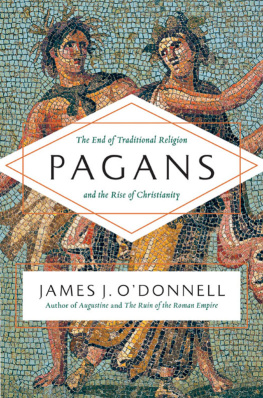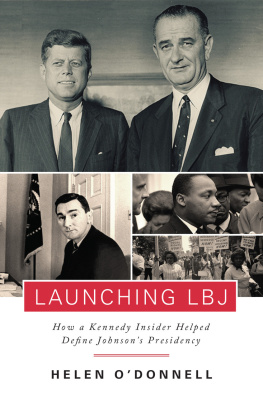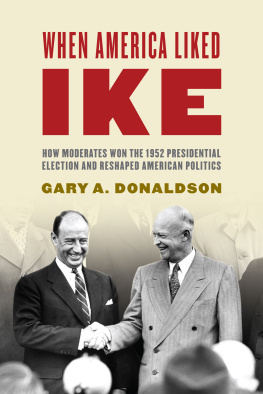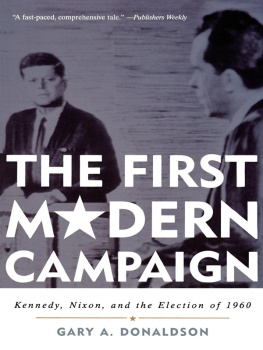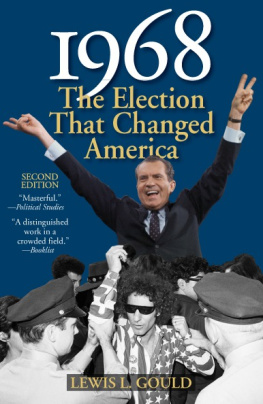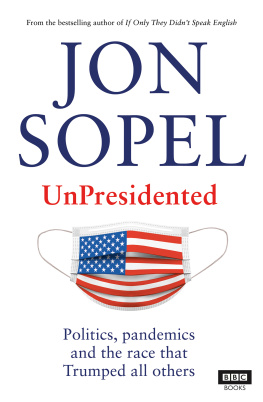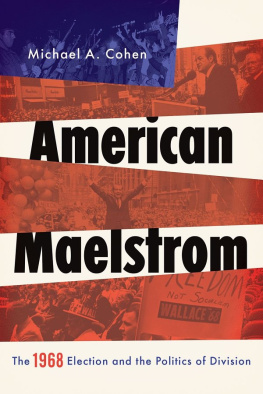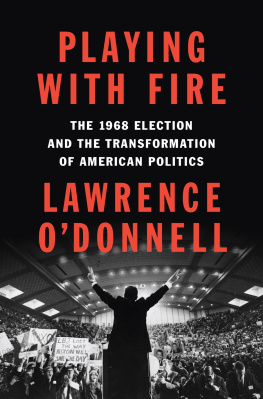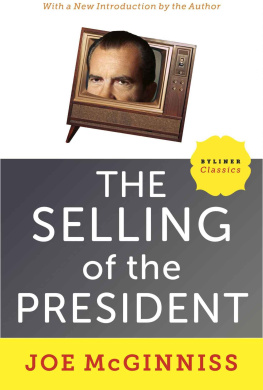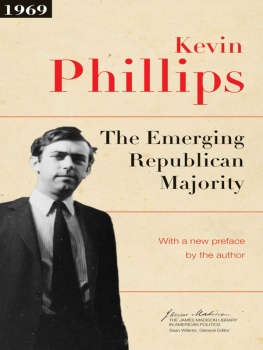ALSO BY LAWRENCE ODONNELL
Deadly Force: The True Story of How a Badge Can Become a License to Kill
PENGUIN PRESS
An imprint of Penguin Random House LLC
375 Hudson Street
New York, New York 10014
penguin.com
Copyright 2017 by E. B. Productions, Inc.
Penguin supports copyright. Copyright fuels creativity, encourages diverse voices, promotes free speech, and creates a vibrant culture. Thank you for buying an authorized edition of this book and for complying with copyright laws by not reproducing, scanning, or distributing any part of it in any form without permission. You are supporting writers and allowing Penguin to continue to publish books for every reader.
Photo credits
: Courtesy of Kentucky Photo Archive
LIBRARY OF CONGRESS CATALOGING-IN-P UBLICATION DATA
Names: ODonnell, Lawrence, author.
Title: Playing with fire : the 1968 election and the transformation of American politics / Lawrence ODonnell.
Description: New York : Penguin Press, 2017. | Includes bibliographical references and index.
Identifiers: LCCN 2017031414 (print) | LCCN 2017032254 (ebook) | ISBN 9780399563157 (ebook) | ISBN 9780399563140 (hardcover)
Subjects: LCSH: PresidentsUnited StatesElection1968. | United StatesPolitics and government1963-1969.
Classification: LCC E851 (ebook) | LCC E851 .O33 2017 (print) | DDC 324.973/0904dc23
LC record available at https://lccn.loc.gov/2017031414
Version_2
For Elizabeth
CONTENTS
SEIZING THE MOMENT
R ichard Nixon was in a makeup chair when he met Roger Ailes. Maybe it was the makeup chair that set Ailes off. He was looking at the man who might have been president now if he had just sat in the makeup chair CBS offered him in Chicago before the first televised presidential debate in American history. Nixon had ignored the networks makeup artist and used a drugstore product called Lazy Shave to cover his heavy five oclock shadow. Nixon once said, I can shave within 30 seconds before I go on television and still have a beard. The day after the debate, the Chicago Daily News ran the headline WAS NIXON SABOTAGED BY TV MAKEU P ARTISTS ? Richard Daley, the all-powerful Democratic mayor of Chicago, said, My God, theyve embalmed him before he even died. Nixon lost the election to John F. Kennedy by two-tenths of 1 percent of the vote, 49.7 percent to 49.5 percent. In an election that close, every mistake matters. A mistake like not getting the makeup right was the kind of thing that infuriated Ailes.
Now, seven years later, Ailes was meeting Nixon for the first time, in the makeup room of The Mike Douglas Show. At age twenty-six, Ailes looked like an assistant, but he was the boss, the executive producer of the show. And Nixon was once again a presidential candidate in what was beginning to look like a crowded field coveting the 1968 Republican nomination.
Ailes wanted Nixon to be president, and he knew the most powerful force blocking Nixons path to the White House was television. To win the White House in the 1960s you had to understand and respect the power of television. Ailes knew that one of Nixons potential rivals for the Republican nomination understood everything about television: Ronald Reagan, the former film and TV actor. Ailes wondered what Nixon had learned about TV since the makeup disaster of the 1960 campaign.
Sitting in the makeup chair, Nixon offhandedly mentioned to Ailes how silly it felt to try to reach voters by appearing on an afternoon talk show like this one instead of a news show like Meet the Press. The Mike Douglas Show was targeted at housewives and usually populated by B-list showbiz celebrities. In response, Ailes instantly rattled off a list of every bad move Nixon had ever made on TV. It was a long list. Ailes was a teenager when he had seen some of these things. This was not the way people talked to former vice president Richard Milhous Nixon. There was none of the deference Nixon had been accustomed to for decades. And he loved it.
Nixon made Ailes an offer he couldnt refuse: instead of trying to make Mike Douglas Americas biggest afternoon TV star, make Richard Nixon Americas next president.
With Ailes on the media team, the Nixon campaign was ready to make the move from being the worst TV campaign to the best. Were going to build this whole campaign around television, Nixon told his media team. You boys just tell me what to do and Ill do it.
Roger Ailess career in Republican politics, which included every day he ran Fox News, turned out to be longer than Richard Nixons. Ailes became more influential in Republican politics than Nixon ever was. We have reason to wonder who would be president today if Richard Nixon had not provoked Roger Ailes in The Mike Douglas Show makeup room. Such are the seeds that were planted in American politics in the 1968 presidential campaign.
RUN, BOBBY, RUN!
Bobby was a natural on television. In 1967, he was the only potential presidential candidate who could charm a TV audience just by being himself. All he needed was his smile. Bobby was the Elvis of American politicsthe only politician who didnt need a last name to identify him. But his last name was everything.
It was Bobby Kennedys last name that made every potential candidate fear him. As the field of candidates began to take shape in 1967, every campaign calculation depended on Bobby even when he showed no signs of wanting to run, even when he told people he wasnt going to run.
President Lyndon Baines Johnson feared Bobby to the point of obsession. Johnson thought Bobby was the only one who could do the unthinkablechallenge the incumbent presidents grip on the Democratic nomination. Johnson was sure that Bobby was the only Democrat who might dare to run against him. He was wrong.
Nixon feared Bobby, too, as did every Republican planning a campaign. Nixon knew exactly what to fear. He had lost to a Kennedy before. Losing to a Kennedy meant losing to the Kennedy political machine, and it meant losing to the Kennedy style. A political machine can be beaten by a better political machine, though Nixon had never seen a better political machine than the Kennedys. Kennedy style was something else. Nixon knew there was nothing Ailes could do for his image that could compete with Kennedy style.
Nixon couldnt change his sharply receding hairline. At fifty-four, he was too old to do anything but tamp down his short dark hair as flat as possible on his head. Bobbys hair had grown longer every year of the 1960s; now, at forty-two, he had the shaggiest hair in the United States Senate. His little brother, Ted, was the only other senator with as full a head of hair.
Bobbys hair was beginning to grow over his earsrock-musician length for the Senate then. And everywhere Bobby spoke outside the Senate chamber, he was treated like a rock star. Thats what Nixon and Johnson feared most about Bobby, the way crowds responded to him. They had never seen anything like it in politics. Nixon and Johnson were both old enough to remember the first time anyone saw fans screaming and swooning for Frank Sinatra in the 1940s before, during, and after every song Sinatra sang. America saw an even more intense version of that fan reaction when the Beatles landed in the United States in 1964. And now Nixon and Johnson saw a version of it happening to Bobby.
Everywhere Bobby went, crowds worked themselves into frenzies. When he spoke, he didnt sound like any senator they had heard before. His voice wasnt stiff and self-conscious. His language wasnt stilted or senatorial. What Bobbys audiences believed they were hearing was a man speaking from the heart about the moral issues of the day: racial discrimination, poverty, the increasingly unpopular war in Vietnam. Johnson and Nixon noticed that there was more political calculation in Bobbys speeches than his audiences realized. Bobby never said what he would do about Vietnam. What mattered to his audiences was that he didnt sound like Johnson, who had escalated the war and was drafting hundreds of thousands of young men into the army and sending tens of thousands of them to their deaths for reasons they couldnt understand or accept in a little country they had never read about in history class. Bobbys adoring audiences believed he would never send them or their friends or their brothers or their cousins or sons or grandsons or boyfriends to die in Vietnam. It could happen to anyone in America then. Anyone could lose a loved one in Vietnam. It was a daily fear for almost everyone in the country. Bobby would stop all that. Thats what his audiences heard, even if he didnt exactly say it.


